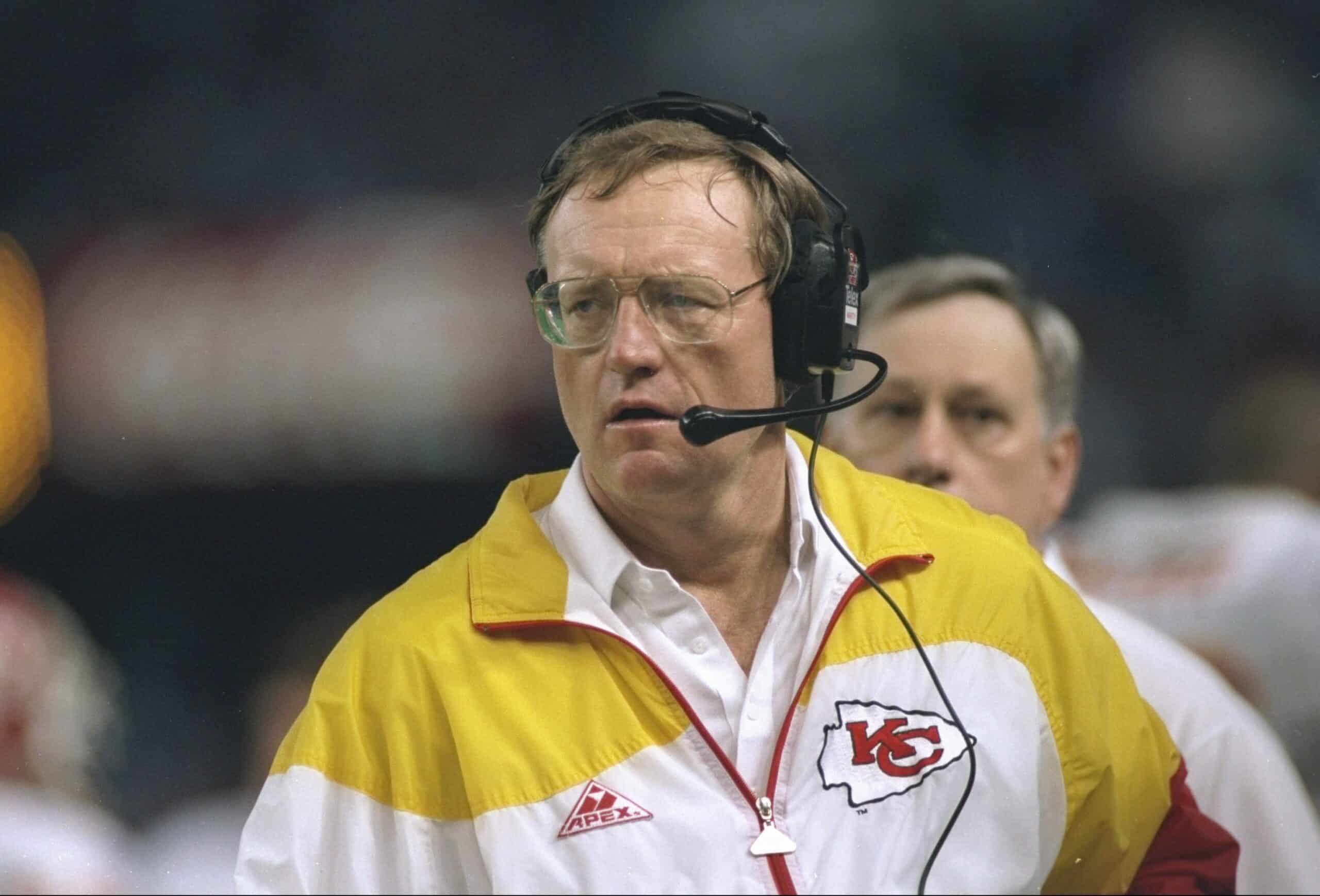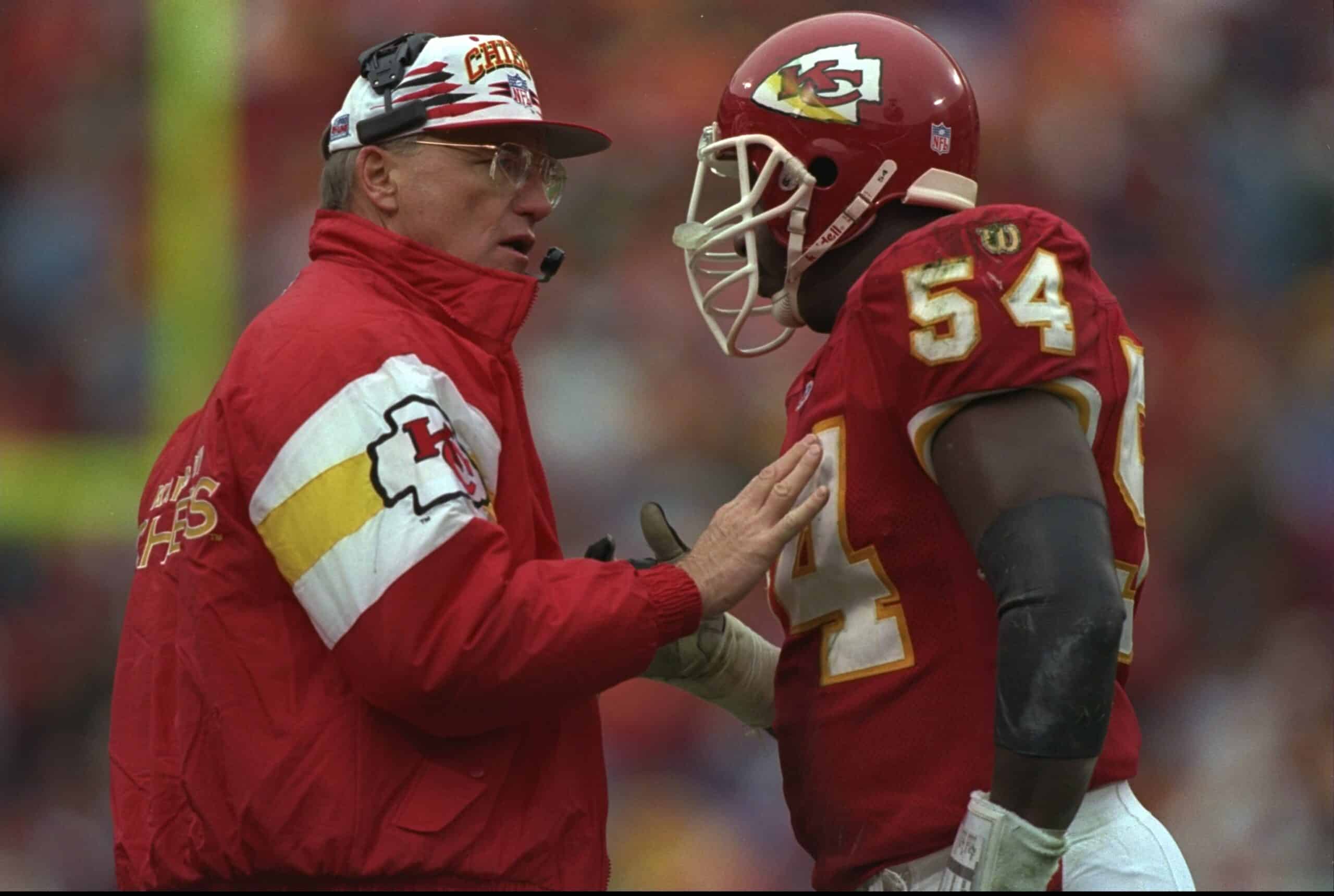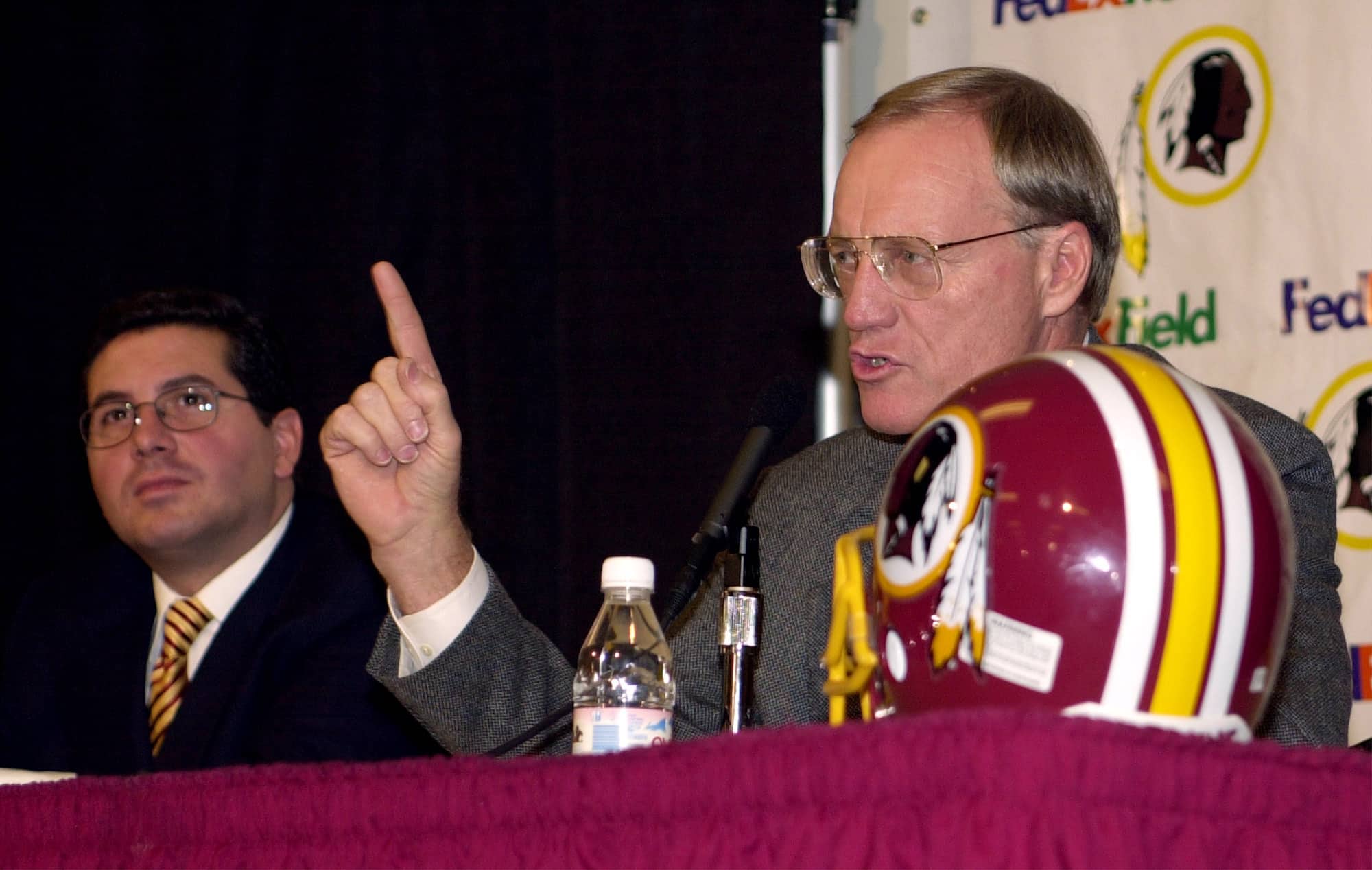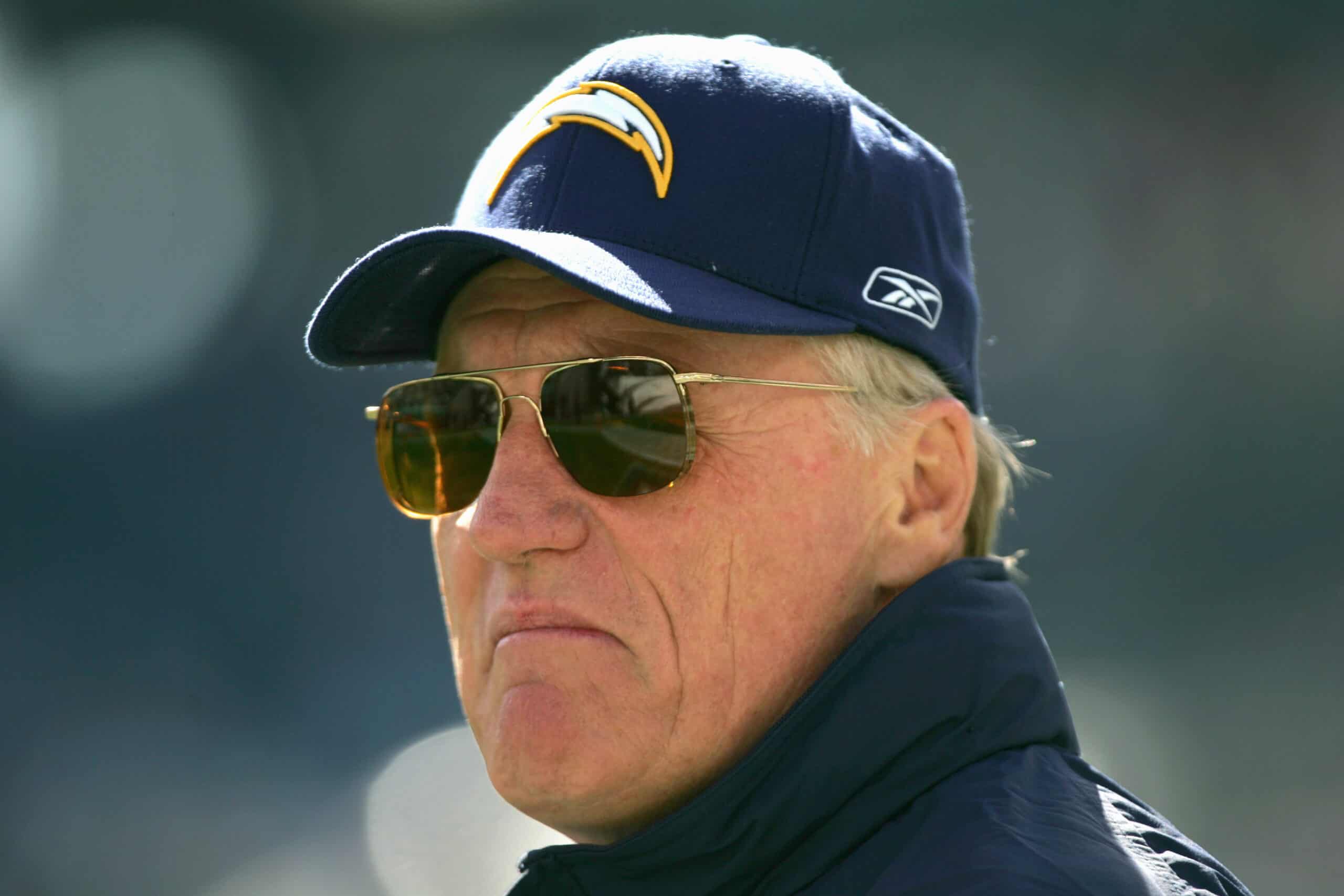It is an understatement to say that, for any team to truly succeed, it needs a good head coach.
It’s not so much the personality, the coach must know the game and command respect.
The Browns recognize this, having spent two decades with subpar coaching since returning to the league in 1999.
Thankfully, Kevin Stefanski has breathed new life into the Cleveland organization and there is healthy optimism of a championship on the horizon.
Before Stefanski came along, the last Browns coach to win on a consistent basis was Marty Schottenheimer.
From his first full year as head coach (1985) until his last in Cleveland (1988), Schottenheimer never had a losing record.
He also led the team to two AFC Championship games against the Denver Broncos.
Even after leaving the Browns, Schottenheimer continued to make his mark in the NFL with his coaching acumen.
Each team he led won on a consistent basis and he left a lasting legacy on franchises and players alike.
This is the story of the life and career of Marty Schottenheimer.
This one hits hard. RIP Marty Schottenheimer. Condolences to his family #Browns 😢 pic.twitter.com/6rv37JKRTK
— CleWest (@erjmanlasvegas) February 9, 2021
Early Life and College
Martin Edward Schottenheimer was born on September 23, 1943 in Canonsburg, Pennsylvania.
As a western Pennsylvania youth, he was practically indoctrinated to play the sport of football.
Schottenheimer played the game at Fort Cherry High School in McDonald, Pennsylvania.
He was an all state athlete on the gridiron and was a starter for the Rangers PIAA championship basketball team.
When it came time to choose a college, Schottenheimer stayed close and became a member of the University of Pittsburgh Panthers.
While at Pitt, Schottenheimer played center and linebacker.
From his sophomore through senior seasons, Schottenheimer earned three varsity letters.
His junior year was memorable when he helped the Panthers to a 9-1 record and a number three ranking in college football.
Notables from 1965 College All-Stars:
Roger Staubach (Navy)
Dick Butkus (Illinois)
Gale Sayers (Kansas)
Fred Biletnikoff (FSU)
Bob Hayes (FAMU)
Marty Schottenheimer (Pitt)
Jack Snow (ND)
Ken Willard (UNC)
Ralph Neely (OU)
Bill Curry (GT)
Craig Morton (Cal)
HC Otto Graham (USCG) pic.twitter.com/zSalhjy1rc— Kevin Gallagher (@KevG163) August 6, 2020
His final season in 1964 was also extraordinary.
That year Schottenheimer earned Second-team All-American honors.
He was also invited to play in the Senior Bowl and the College All-Star game.
As fate would have it, the opponent that day would be his future employer, the Cleveland Browns.
Not only was Schottenheimer impressive on the field, he was remembered for his professionalism off the field.
“What I remember most about Marty was that studious look he had with those glasses,” former ESPN commentator (and Pitt Sports Information Director from 1956-1966) Beano Cook said in Schottenheimer’s 2012 autobiography Martyball. “He looked more like a college professor than a linebacker. And he was so well spoken and literate. But let me tell you, he was a damn good football player, too. Don’t let him or anyone else kid you. I sent out letters to every sportswriter in the country trying to get him first team All-American his senior year. He deserved it. He was that good. He wound up second team All-American but he should have been first team.”
Schottenheimer Drafted by Two Leagues
With his college eligibility complete, Schottenheimer was about to embark on the next stage of his life.
Due to his stellar career at Pitt, Schottenheimer had interest not only from the NFL but the American Football League as well.
He was selected by both leagues in their respective 1965 drafts.
The Baltimore Colts grabbed Schottenheimer in the fourth round of the NFL Draft.
He was also selected in the seventh round by the Buffalo Bills of the AFL Draft.
Despite the glamour of the NFL, Schottenheimer chose to ply his trade with Buffalo.
During his rookie season of 1965, Schottenheimer was part of the Bills AFL Championship.
He was named an AFL All-Star that year as well.
For the next four seasons (1965-1968) he played linebacker for the team, serving mostly as a starter.
In the 1969 preseason, Schottenheimer collected two interceptions in a contest versus the Houston Oilers.
Rest In Peace to former Pitt Panthers & Buffalo Bills linebacker Marty Schottenheimer pic.twitter.com/SEn1UQjHLC
— Joe Lozito (@joe_lozito) February 9, 2021
A few weeks later, Schottenheimer was traded to the Boston Patriots and spent the 1969 and 1970 seasons with the franchise.
In July of 1971, he was traded to the Pittsburgh Steelers for Mike Haggerty.
Then, just before the 1971 season commenced, he was traded again to the Colts for an undisclosed draft pick.
Instead of playing for Baltimore, Schottenheimer retired from the game.
His playing career consisted of 79 games, six picks, and one interception returned for a touchdown.
Next Stop, Coaching Assistant
After leaving the game, Schottenheimer got into real estate.
The World Football League began in 1974 and Schottenheimer got the itch to play again.
He signed with the Portland Storm franchise as a player-coach.
Before the ‘74 season began, however, Schottenheimer injured his shoulder, knocking him out of his player role.
Schottenheimer stayed with Portland as their linebackers coach in 1974 and thus began a second career in football.
The following season, the New York Giants hired Schottenheimer as their linebackers coach.
In 1977, the Giants promoted him to defensive coordinator.
During the 1978 and 1979 seasons, Schottenheimer moved west where he served as linebackers coach for the Detroit Lions.
In 1980, Cleveland head coach Sam Rutigliano hired Schottenheimer to be his defensive coordinator.
He was still in that position in 1984 when Rutigliano was axed on October 22.
Schottenheimer Becomes Browns Head Coach
The Browns under Rutigliano had been an interesting lot.
The 1979 and ‘80 versions of the team were coined “The Kardiac Kids,” thus named for their last second wins (and losses).
In 1980 and 1982, the franchise lost to the Raiders, including a close 14-12 loss in ‘80 on the infamous “Red Right 88” play.
By the halfway point of 1984, the fans and owner Art Modell had lost patience with Rutigliano.
After a 1-7 start to the year, he was fired and replaced by Schottenheimer.
The interim coach would finish the season 4-4 and was promoted to full time coach after the year.
Almost immediately, Cleveland began to emulate its tough-nosed coach.
The team picked up University of Miami quarterback Bernie Kosar in the 1985 supplemental draft as well as various other stalwart players.
During the ‘85 season, the Browns went 8-8 and narrowly lost to the Dolphins in the Divisional Playoffs.
However, there was reason for optimism based on what the public saw from the team that year.
“The Browns’ days, the good days, are here and ahead of us,” radio personality Pete Franklin said after the Miami game.
Two of the greatest ever.
#19 Bernie Kosar and Coach Marty Schottenheimer pic.twitter.com/hT0Bii7oHj— Vintage Browns (@VintageBrowns) October 17, 2020
Denver gets in the way of a Super Bowl Berth
In 1986, Cleveland improved to 12-4 and defeated the Jets in two overtimes 23-20 in the Divisional round to advance to the AFC Championship game.
The following week, with just under six minutes left in regulation, the team led Denver 20-13.
Broncos quarterback John Elway then led his team on a 98 yard march down field and tied the game with 37 seconds left.
Cleveland was out of the postseason for the second year in a row when Denver scored first in overtime to win 23-20.
The game was nicknamed “The Drive” due to Elway’s exploits and immediately hailed as a classic in NFL history.
Schottenheimer was recognized for his leadership after the season when he was named the NFL’s Coach of the Year.
The 1987 season was slightly interrupted by a players strike and the Browns ended the year 10-5.
In the Divisional round, the team beat the Colts handily 38-21 and faced the Broncos again in the AFC title game.
In a hard-fought, back-and-forth game, the Browns were driving down field near the end of regulation in an attempt to tie the score at 38.
Instead, running back Earnest Byner was stripped of the ball at the two yard line by Broncos defensive back Jeremiah Castille.
Castille fell on the ball and thwarted the Browns attempt to advance to the Super Bowl.
The Denver game was also bequeathed with a moniker of “The Fumble” due to Byner’s Gaffe.
The 1988 Browns team was poised for another Super Bowl run.
However, after finishing 10-6 in the regular season, Cleveland lost to division rival Houston 24-23 in the Wild Card round.
Schottenheimer Leaves Cleveland/Hired by Kansas City
Even though Schottenheimer had led the Browns to the postseason each full year he was a head coach, Modell was not happy.
Modell’s insistence that Schottenheimer hire an offensive coordinator eventually wore down the coach.
Instead of putting up with the owner’s constant griping, Schottenheimer stepped down after the ‘88 season.
In each of his four years as full-time head coach, the Browns never had a losing record.
He was not unemployed for long.
Kansas City had fired their coach, Frank Gansz, and were looking for someone to restore glory to the franchise.
Enter Schottenheimer, who was a favorite of Chiefs President Carl Peterson.
“Marty Schottenheimer is without doubt the most qualified and proven coach available in the NFL today,” said Peterson. “His availability at this time is both timely and fortunate for the Kansas City Chiefs.”
Schottenheimer Continues to Succeed as Coach
In 1987 and 1988 (pre-Schottenheimer), the Chiefs went 4-11 both seasons.

Schottenheimer led the organization to an 8-7-1 record in his first year.
Though the team did not make the playoffs, the franchise was building in key positions.
After the 1989 season, rookie linebacker Derrick Thomas was named NFL Defensive Rookie of the Year on the strength of his 10 sacks.
Running back Christian Okoye was named the AFC’s Offensive Player of the Year after he rushed for 1,480 yards.
Marty Schottenheimer Stats with the Chiefs
Games – 160
Record – 101-58-1 (.634)
*Points – 12th
*Points Allowed – 9th
*Yards – 12th
*Yards Allowed – 10th
*Takeaways – 8th*Average League Rank
The Chiefs are better off because of Marty's legacy. Rest in peace, Coach! pic.twitter.com/70YXslronZ
— Chiefs Focus: Behind the Numbers 📊 (@CFStatistics) February 10, 2021
Beginning in 1990, Kansas City made the playoffs for six consecutive years.
Along the way, various Chiefs players were chosen for their contributions during particular seasons.
Running back Barry Word was recognized as Comeback Player of the Year in 1990 when the team went 11-5 and Word rushed for 1,015 yards.
In 1992, Dale Carter was named Defensive Rookie of the Year after hauling in seven picks from his corner position.
Montana and Allen join Schottenheimer in KC
The Chiefs made significant headlines before the 1993 season began.
Former San Francisco quarterback legend Joe Montana left the 49ers and signed with Kansas City.
Also added to the team was a former division rival in running back Marcus Allen of the Raiders.
With Montana and Allen as the focal point of their offensive attack, the Chiefs went 11-5 during the regular season.

In the Wild Card round, the team upended the Steelers 27-24 and then took down Houston 28-20 in the Divisional Playoffs.
The magic ride concluded in the AFC Championship game when the Buffalo Bills defeated KC 30-13.
After the season, Allen was named Comeback Player of the Year and Thomas was named Walter Payton Man of the Year.
Chiefs haven't won a playoff game since 1993. Joe Montana was their quarterback #NFLPlayoffs » pic.twitter.com/k3d7NH4ODI
— SportsCenter (@SportsCenter) January 4, 2014
In 1994, Montana and Allen were still potent, but were clearly showing their age.
The Chiefs ended the year 9-7 and lost in the Wild Card round 27-17 to the Dolphins.
When the season concluded, Montana officially retired from the game.
1995-1998
With Montana gone, many pro football writers believed Kansas City would take a giant step backwards.
Instead, the organization rode the arm of former Montana backup (in San Francisco and KC) Steve Bono in 1995.
Bono helped lead the Chiefs to a surprising 13-3 record, although KC lost to the Colts 10-7 in the Divisional Playoffs.
For the second time in his career, Schottenheimer was named as the Coach of the Year.
After missing the playoffs in 1996, the franchise returned in ‘97 after another 13-3 record.
In the Divisional Round, Schottenheimer lost to his old nemesis, the Broncos, 14-10.
Then, in 1998, Schottenheimer had his first losing record as a full-time head coach when Kansas City ended the year 7-9.
The coach was criticized for his conservative play calling during the year.
With the mix of a heavy run game, safe passing plays, and aggressive defense, Schottenheimer’s game plan was coined “Martyball.”
After the ‘98 season, Schottenheimer chose to resign as coach of Kansas City.
Brief Stop in Washington
For the next two years, Schottenheimer was an analyst for ESPN.
During his time at the network, Schottenheimer would frequently criticize Washington owner Daniel Snyder for meddling in the team’s affairs.
It was because of this analysis that the sports world was shocked when Snyder hired Schottenheimer to be his head coach in 2001.

After losing their first five games to begin the year, the Redskins won their next five games.
The team then won eight of their final eleven games to finish ‘01 with an 8-8 record.
The record matched the previous season’s win/loss total, but it was clear the organization was set to improve in 2002.
Watching A Football Life Marty Schottenheimer, what could have been 🤷🏻♂️🤔#Redskins #HTTR #RollSkins pic.twitter.com/Syee9VYGOQ
— Adam Aniba w/ The Burgundy and Gold Report (@TheBandGreport) April 6, 2019
Instead, Snyder meddled again and fired Schottenheimer on January 13, 2002.
The owner then brought in former University of Florida head coach Steve Spurrier to run the team.
In two seasons as head coach, Spurrier would produce a 7-9 record in 2002 and a 5-11 record in 2003.
On to San Diego
Because he was fired by Snyder, Schottenheimer could have lived the good life.
He was still being paid $7.5 million from the Redskins for doing nothing.
Instead, the San Diego Chargers came calling with an offer.
They had performed miserably under Mike Riley and were looking for a shakeup.
Schottenheimer jumped at the opportunity.
Schottenheimer was given a hefty four year, $10 million deal.
Then, he was asked the question of whether he could take the Chargers back to the postseason.
At the time of his hiring, the team had not been to the playoffs since 1995.
Schottenheimer was then asked by the media about his own inability to get to the championship.
“My ambition is to coach a championship football team and we haven’t done that yet,” Schottenheimer said after being introduced at a news conference. “That remains my sole objective.”
The coach further elaborated on his poor postseason track record.
“It’s reality. It is what it is. I wish it were better; it’s not. Somebody once said, ‘The truth freezes all.’ So I recognized that it’s not very good, certainly not what we’d like.”
For his part, then team owner Alex Spanos was thrilled with Schottenheimer’s hire.
“I used to hate playing against him,” Spanos said in introducing Schottenheimer. “I can’t tell you how happy I am that he’s on our side.”
Almost immediately, Chargers fans wondered if Schottenheimer was indeed the correct choice.
In his first two seasons, 2002 and 2003, San Diego went 8-8 and 4-12 respectively.

However, their 2003 record would net the team the first pick in the 2004 NFL Draft.
The fortunes of the franchise were about to change.
Rivers Arrives
In the lead up to the draft, the thinking around NFL circles was that the Bolts would select Ole Miss quarterback Eli Manning.
Manning came from pro football royalty.
His father, Archie, played in the league and his brother, Peyton, was already a star with the Colts.
However, there was a slight hiccup with the idea of Manning going to San Diego.
To put it bluntly, he didn’t want to play for the Chargers.
The team selected him anyway then flipped him to the Giants in exchange for NC State quarterback Phillip Rivers.
Rivers had to wait his turn, however.
Already on the roster was Drew Brees and Doug Flutie.
Return to the Playoffs Leads to Disappointment
With Brees at the helm, Schottenheimer and the Bolts posted a 12-4 record in 2004, making the postseason for the first time in almost a decade.
After the team was dispatched in the Wild Card round by the Jets, Schottenheimer was named Coach of the Year and Brees was selected as Comeback Player of the Year.
In 2005, San Diego surprisingly missed the playoffs with a 9-7 record.
However, linebacker Shawne Merriman was named the NFL’s Defensive Rookie of the Year.
The following year, the team posted the best record in the league at 14-2 (it would prove to be Schottenheimer’s best season record as well).
Brees was joined by all-world running back LaDainian Tomlinson who would be named the league’s MVP along with Offensive Player of the Year and Walter Payton Man of the Year.
San Diego Chargers coach Marty Schottenheimer remembered https://t.co/W3jOiexAbC pic.twitter.com/P338pOCDTk
— The San Diego Union-Tribune (@sdut) February 9, 2021
The Chargers were the top seed in the 2006 postseason and faced the Patriots in the Divisional Round.
Despite the amazing season by the team, they were upset by New England 24-21.
Kicker Nate Kaeding missed a 53 yard field goal attempt at the end of regulation to force the game into overtime.
The loss was yet another playoff blunder in Schottenheimer’s career.
Days after the loss, Dean Spanos (son of Alex Spanos) announced that Schottenheimer would return for the final year of his deal.
However, the coach declined a one year extension for 2008 that would have paid him $4.5 million.
Then, on February 12, 2007, Schottenheimer was unexpectedly fired.
Asked for a reason, Spanos noted “dysfunction” between Schottenheimer and general manager A.J. Smith.
Also cited was the fact that several of Schottenheimer’s assistants left for head coaching or coordinator jobs elsewhere.
“When I decided to move ahead with Marty Schottenheimer in mid-January, I did so with the expectation that the core of his fine coaching staff would remain intact,” Spanos said in a statement. “Unfortunately, that did not prove to be the case, and the process of dealing with these coaching changes convinced me that we simply could not move forward with such dysfunction between our head coach and general manager. In short, this entire process over the last month convinced me beyond any doubt that I had to act to change this untenable situation and create an environment.’’
With that, Schottenheimer left the NFL with an overall record of 200-126-1 (including the partial 1984 season with Cleveland).
His teams made the postseason 13 times.
Schottenheimer Finally Wins a Championship
After four years in retirement, Schottenheimer came back to coach in 2011 for the Virginia Destroyers of the United Football League.
The season was shortened to five games and Schottenheimer led Virginia to a 4-1 record, a playoff berth, and home field advantage for the playoffs.
In the UFL Championship game, the Destroyers upset the two-time defending champion Las Vegas Locomotives 17-3.
It was Schottenheimer’s first championship as a coach.
He was also named the league’s coach of the year.
RIP to the great Marty Schottenheimer. The 757 was fortunate to have him for a short season as head coach of the Virginia Destroyers. pic.twitter.com/DqmHRC1DmI
— Brian Parsons (@bpar73) February 10, 2021
Schottenheimer resigned from his position with the Destroyers before the 2012 season, citing unmet specifications for his return as coach.
Legacy and Death
In 21 years (22 if you count his year with the Destroyers), Schottenheimer only had two losing seasons (1998 and 2003).
Yet, throughout the later half of his career, Schottenheimer was associated with one word, “Martyball.”
The word first appeared when he coached the Chiefs and would surface each time his team missed the playoffs.
With news about Marty Schottenheimer moving to hospice, it’s only right to pay tribute to the @Chiefs great #martyball pic.twitter.com/l1lUejsf10
— patrickmirch63 (@patrickmirch63) February 4, 2021
Essentially, Martyball was a conservative style that left a little to be desired in the offensive department.
Schottenheimer’s teams had aggressive defenses and usually solid running games.
However, the coach was accused more than a few times of playing not to lose.
His teams, especially the Chargers, were expected to win big in the playoffs yet underwhelmed instead.
Schottenheimer’s final five playoff appearances resulted in first round exits.
Away from the game, Schottenheimer had married his wife, Pat, in 1968.
Together, they had two children, their daughter, Kristin, and son Brian.
Brian entered the family business in 1997 and was recently hired in February of 2021 by the Jaguars to be head coach Urban Meyer’s passing game coordinator.
In 2011, Schottenheimer was diagnosed with Alzheimer’s disease.
https://www.youtube.com/watch?v=c5r_TmOSosQ
The disease slowly progressed until he was placed in hospice care in 2021.
Schottenheimer died on February 8, 2021 from complications of Alzheimer’s.
After learning of his passing, the football world sent their condolences to the family as well as heaped praise on Schottenheimer as a man.
The accolades prove there was much more to Schottenheimer than a nickname.
NEXT: The Life And Career Of Chip Banks (Complete Story)“Coach Schottenheimer made it fun to be a Browns fan again in the 1980s,” Pitt head coach Pat Narduzzi said. “He really revitalized that team and made them an annual Super Bowl contender. He was a tremendous coach, but an even better leader. I think that’s why he raised the level of every organization he ever joined. We are proud to call him a Pitt Man and our entire program extends its deepest sympathies to the Schottenheimer family.”
“I never went into a game with Marty as coach feeling like I wasn’t fully prepared to win,” Tomlinson said. “He really wanted you to understand every detail of the game plan. I considered him a true All-American man. He was a great father figure, and I was fortunate that my wife and I got to know he and [his wife] Pat beyond the typical player and coach relationship. He was a well-rounded human being. He cared more about the man than the athlete. I will remember him more for the life lessons that he taught me.”
“We know he is looking down on us from heaven and smiling,” his daughter said. “We are so incredibly proud of the man he was and how he lived his life.”
